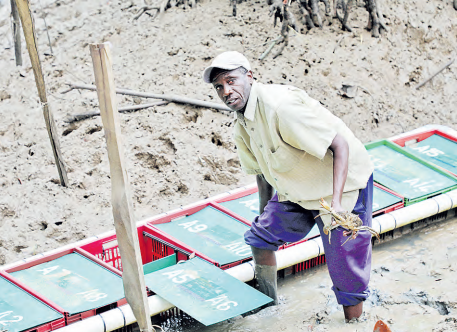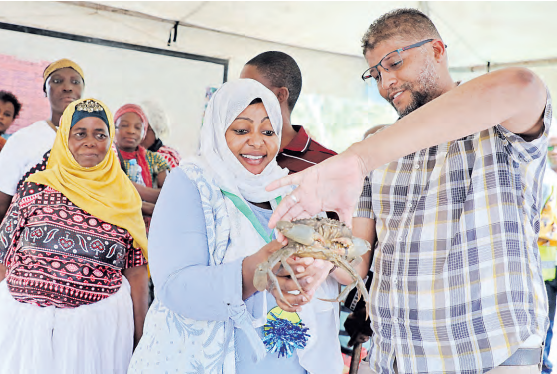
For years, fishing along Kenya’s coast has been a venture undertaken by men.
The deep seas were the domain of the tried and tested, who would brave the waters, return with the day’s catch and hand over the baton to women, who would then prepare, fry and sell for modest profits.
Women, locally known as ‘Mama Karanga,’ would line the shore, waiting for the catch to land. The women would then buy whatever they could to sustain their small-scale businesses.
That has since changed. In the Jomvu area of Mombasa, a group of adventurous women have taken a bold step.
Through determination and innovation, these women are improving their livelihoods and fostering sustainable development within their coastal community.
Moving beyond the traditional roles, the Jomvu Women in Fisheries have taken up the lucrative yet challenging business of mud crab fattening. The community-based organisation’s journey began in 2021, when the world was grappling with the Covid-19 pandemic.
Spearheaded by women who previously plied their trade as Mama Karangas, the group boasts 28 members who have united to tap into the waters of crab aquaculture.
Charity Baya, the chairperson and one of the founding members, recalls their humble beginnings. “We started as an all-women group, but as the work grew, we brought in three men to assist with the day-to-day activities,” she said.
The men play a supportive role in the more physically demanding tasks. The group has installed crab cages in the Jomvu Mission Creek, part of the Indian Ocean, where they nurture crabs to marketable sizes.
A single cage, capable of housing up to 100 crabs, can generate significant returns, with the shellfish fetching between Sh900 to Sh1,400 per kilogramme.
With two cages currently in operation, the women have a steady source of income. “Most of our members are mothers and they can all attest to the positive impact this venture has had on their livelihoods,” Baya said.
Beyond crab fattening, the group has ambitious plans to boost eco-tourism.
They are building a boardwalk through the lush mangrove forests of the Creek. Once complete, the boardwalk will offer guided nature tours, creating an additional stream of income.
“We’re training our members to become tour guides, lifeguards and other tourism-related skills,” Baya explained.
“Most of the women previously made a profi t of around Sh200 per day from fi sh frying. We are hopeful that with the boardwalk and crab projects, we can generate over a million shillings annually.”
David Nyamu, one of the men in the group and its secretary, emphasised the role of collaboration and knowledge-sharing in their success.
“Initially, our group was solely composed of women who were involved in frying fish. But through the exchange of ideas, we realised we could do more to uplift our lives,” he said.

The group’s innovative approach
caught the attention of Kenya Marine
Fisheries and Socio-Economic Development project, which provided
funding for the mud crab fattening
and the boardwalk initiatives.
KEMFSED gave the group a Sh2.7-million grant for the projects. “We’re aiming to harvest and sell around 200 crabs every month, potentially generating over Sh200,000,” Nyamu said.
“The mud crab project takes between three weeks to a month to reach the desired weight for sale and this has created a steady income for our members.”
In addition to their aquaculture eff orts, the Jomvu Women in Fisheries have taken up environmental conservation.
They plant and nurture mangrove seedlings, which not only serve as a breeding ground for fish and crabs but also act as a natural barrier against coastal erosion. This has already seen over 700,000 seedlings grown.
“We’ve taken it upon ourselves to conserve the environment, both for the sake of our livelihoods and for future generations,” Nyamu said.
The group’s projects have created direct employment opportunities for its members and for the broader Jomvu community.
By engaging local fishermen and training youth, they are ensuring the sustainability of their initiatives. “We’re keen on passing down our knowledge to the next generation. This is not just a business; it’s a legacy we want to leave behind,” Nyamu said.
Theirs is a powerful example of how community-driven initiatives can transform lives. KEMFSED’s Environmental Safeguards Officer for Mombasa, Samuel Okech, said they support grassroots initiatives to empower communities.
“Many communities along Kenya’s coastal strip have not had equal economic opportunities due to various challenges, including limited access to sustainable development resources,” he said.
“Our focus is to address this by financing initiatives that promote energy sustainability, which not only stimulates the economy but also aligns with Kenya’s commitment to addressing climate change and environmental degradation,” he said.
Mombasa Blue Economy, Agriculture and Livestock Executive Kibibi Abdalla said they have supported the group and several others in the region.
“The County Government of Mombasa has been supporting over 40 groups under the umbrella of Beach Management Units, linking them with investors and fi nancial institutions to acquire fi nancial literacy and benefi t from fi nancial incentives,” Abdalla said.
Apart from financial help, the county has also supported the Jomvu Women in acquiring necessary permits, such as the Kenya Forest Service permit.
The groups have been brought together into cooperatives. There are 16 cooperatives formed under the umbrella of the Beach Management Units.
The CEC says they train group members in matters under the Fisheries Act, fish handling and food safety, sustainable mariculture practices and entrepreneurship.









![[PHOTOS] Uhuru visits Raila's grave in Bondo](/_next/image?url=https%3A%2F%2Fcdn.radioafrica.digital%2Fimage%2F2025%2F10%2F0a7bb837-9eaa-4053-be84-0ba48cc9964b.jpg&w=3840&q=100)


